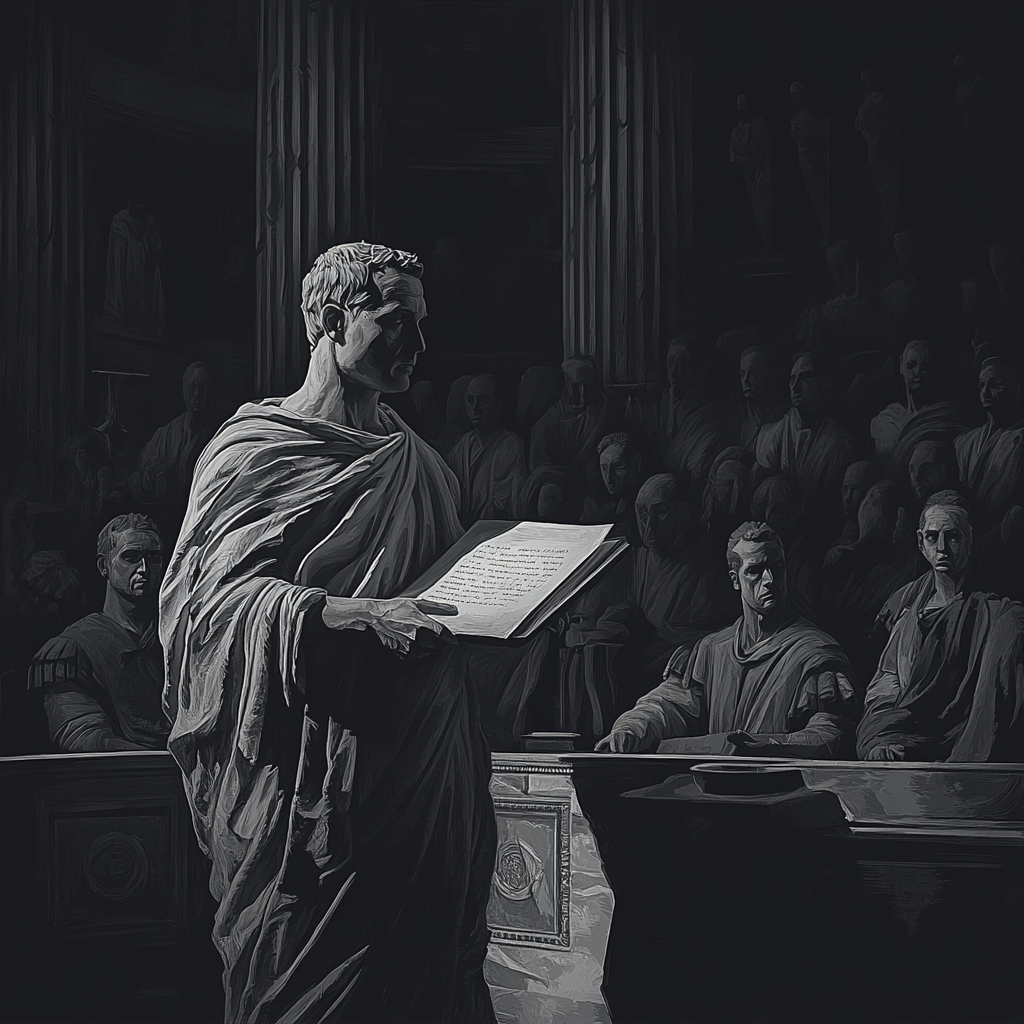Cicero: Philosophy as a Guide for Public Life
Marcus Tullius Cicero (106–43 BCE), one of Rome’s greatest orators, statesmen, and philosophers, approached Philosophy as a Guide for Public Life, and his works have left a lasting impact on Western thought. While Cicero engaged deeply with philosophy, he did so with a clear focus on its practical application, especially in public life and politics. Unlike philosophers devoted solely to abstract theories or personal ethics, Cicero believed that philosophy should guide action, particularly for those in governance and public service. For Cicero, moral philosophy provided the foundation for just leadership, ethical governance, and the common good.
Cicero’s philosophical works, particularly On Duties (De Officiis), On the Republic (De Re Publica), and On Laws (De Legibus), explore how moral principles can inform political leadership, the role of virtue in public life, and the responsibilities of citizens and statesmen. His ideas emphasize the importance of moral integrity, reason, and justice in maintaining a well-ordered society.moral integrity, reason, and justice in maintaining a well-ordered society.
Philosophy and Civic Duty
Cicero believed that the purpose of philosophy was not only to help individuals live good lives but also to provide guidance on civic duty and public morality. He saw the philosopher as an active participant in public affairs, using wisdom and virtue to guide their decisions for the betterment of society.
Cicero’s view of public life was deeply influenced by the Stoic and Platonic traditions, which emphasized the importance of rationality, virtue, and justice in leadership. However, he adapted these ideas to suit the Roman context, where political life was often chaotic and morally complex. For Cicero, political leaders had a moral duty to act with justice, wisdom, and moderation.
1. Public Service as a Moral Duty
One of Cicero’s central beliefs was that those in positions of power have a moral obligation to serve the public good. In his work On Duties, Cicero explains that the highest form of duty is to benefit society and contribute to the well-being of others. This duty, according to Cicero, must always take precedence over personal ambition or gain.
He argued that political leaders should be guided by ethical principles, such as justice and fairness, and should strive to promote the common good rather than seeking wealth, power, or glory for themselves. Cicero believed that good governance required leaders to act with integrity and to make decisions based on what is right, not what is popular or personally advantageous.
2. The Role of Virtue in Public Life
For Cicero, virtue was the foundation of both personal morality and effective leadership. He identified four cardinal virtues that are essential for both private and public life:
- Wisdom (Prudence): The ability to judge what is right and wrong, and to make decisions that serve the common good.
- Justice: Treating others fairly and ensuring that laws and policies are applied equally to all.
- Courage: The strength to face adversity and take difficult actions when necessary, particularly in defense of justice and the public good.
- Temperance: The ability to exercise self-control and moderation, avoiding excess in both personal behavior and public policy.
These virtues, according to Cicero, should guide the actions of all individuals, but they are especially important for those in leadership positions. He believed that without virtue, political leaders would be corrupted by power and greed, leading to the downfall of the state.
The Influence of Christian Thought on Medieval Philosophy Bridging Ancient Morals with Theology
Justice and the Common Good
Cicero was deeply concerned with the concept of justice and its role in maintaining a stable and prosperous society. In his philosophical writings, he argued that justice is the highest moral principle and the foundation of a good government. For Cicero, justice involves ensuring that everyone is treated fairly under the law and that the rights and dignity of all citizens are respected.
1. Natural Law and Justice
One of Cicero’s most significant contributions to political philosophy is his theory of natural law. He believed that there is a universal moral order, based on reason and nature, that applies to all people at all times. This natural law is unchanging and serves as the ultimate standard of justice, above and beyond the laws made by human governments.
In his work On Laws, Cicero argues that just laws are those that align with this higher, natural law. According to Cicero, true justice is grounded in human nature and reason, and it is the duty of statesmen to ensure that the laws of the state reflect these universal principles of justice. Laws that are unjust or violate the natural rights of individuals should not be followed, as they go against the fundamental moral order of the universe.
2. The Common Good
Cicero placed great emphasis on the idea of the common good — the idea that political decisions should benefit the community as a whole, not just a select group of individuals. He believed that the purpose of government is to promote the welfare of all citizens and that the best leaders are those who act selflessly for the benefit of society.
In his work On the Republic, Cicero presents an ideal vision of a government that is guided by the principle of the common good. He argued that a well-ordered republic must be founded on justice, equality, and shared responsibility. Leaders must always prioritize the good of the people over their own interests, and citizens must work together to ensure that the state serves the common good.
Cicero’s vision of the common good is also reflected in his belief in the importance of civic virtue. He believed that a republic could only thrive if its citizens were virtuous, actively engaged in public life, and committed to upholding the principles of justice and fairness.
Cicero’s Political Philosophy in Action

Cicero’s career as a politician and statesman gave him many opportunities to put his philosophical principles into practice. Throughout his life, Cicero remained committed to the idea that philosophy should serve as a guide for public life, and he often drew on his philosophical beliefs to navigate the challenges of Roman politics.
1. The Catiline Conspiracy
One of the most famous moments of Cicero’s political career was his role in exposing the Catiline Conspiracy in 63 BCE. During his time as consul, Cicero uncovered a plot by the Roman senator Lucius Sergius Catilina to overthrow the Roman government. In a series of speeches known as the Catilinarian Orations, Cicero denounced Catiline and his followers, presenting himself as a defender of the republic and the rule of law.
Cicero’s handling of the conspiracy demonstrated his belief that political leaders have a duty to protect the state from corruption and tyranny. His decisive action to preserve the stability of the Roman Republic aligned with his philosophical commitment to justice and the common good, even though it eventually led to his political exile.
2. Exile and Return
Cicero’s career was marked by periods of both influence and political exile. After his consulship, Cicero was exiled for a time due to his enemies in the Senate, particularly those who resented his role in the execution of Catiline’s followers without trial. However, he later returned to public life and continued to advocate for his vision of a virtuous republic.
During these years, Cicero wrote many of his most important philosophical works, using his time in exile to reflect on the relationship between philosophy and politics. He continued to argue that philosophy should guide statesmen in their decision-making and that the ultimate goal of political life is to promote justice, peace, and the well-being of all citizens.
Legacy of Cicero’s Philosophy
Cicero’s philosophy had a profound impact not only on Roman society but also on the development of Western political thought. His ideas about natural law, justice, and the common good influenced later thinkers in both the Renaissance and the Enlightenment, including John Locke, Montesquieu, and the Founding Fathers of the United States.
Cicero’s belief in the importance of civic duty and virtue has also had a lasting influence on how we think about leadership and public service. He remains a model of the philosopher-statesman, someone who used philosophy not just for personal reflection, but as a tool to guide ethical action in the political arena.
Philosophy as a Guide for Public Life
Cicero’s writings demonstrate that philosophy is not just an abstract discipline but a practical guide for navigating the complexities of public life. For Cicero, political leaders have a moral duty to act with wisdom, justice, and integrity, always prioritizing the common good over personal gain. His emphasis on natural law and the universal principles of justice continues to shape modern discussions on governance, ethics, and the role of the state. By merging the worlds of philosophy and politics, Cicero provided a vision of virtuous leadership that remains relevant today, reminding us that public service is not just a career but a moral calling.

